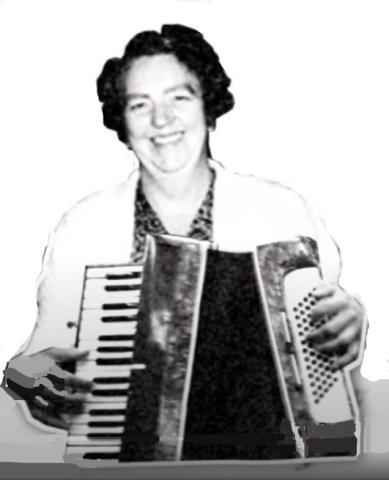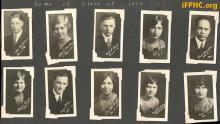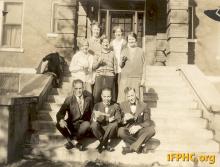Lula Bell Hough was an American missionary (born 1906) who was ordained by the Assemblies of God in 1929 and, aged 23, left her comfortable life in America to go to Guangzhou, South China, to preach the gospel in a previously unreached area. She heard the call to be a missionary as a child and trained at the Central Bible Institute in Springfield, Missouri. She was to spend the next 45 years of her life in China.
She trained and worked initially with intrepid fellow missionary Blanche Appleby. It was a time of hardship, often living in primitive conditions, as did the people she dwelt among. Based at T'sing Yuen in 1934 she made a three week trip to villages in the the Pan Kong district to spread the gospel message - 'While there we went out into the villages each day walking from six to fifteen miles and preaching the gospel wherever we found an open door. In some of the villages we were the first foreigners the villagers had ever seen, and in many, the first to preach the gospel.' (For full account see here, page 8)
In Taai Waan (5 weeks) she said, 'We have sold and distributed about 2000 gospels, and trusting God to bless His word to those who see and hear it... My native speaker and Bible woman* and I are busy holding street meetings, market meetings, and visiting from house to house. God is giving us a very real entrance into many hearts.' (For full account see here, page 11)
She took furloughs (page 9) in 1935 and 1937, staying with relatives in Ohio.
In 1939 because of the Sino-Japanese War in China, Miss Hough moved to Hong Kong, where she started a mission church in a large Chinese house near the cross-roads in Fanling NT, which she pastored for 24 years. Like many missionaries who started mission churches, she provided her own music to accompany the hymn singing; her instrument was an accordion.
Miss Hough was a friend and neighbour and a regular visitor to the Fanling Babies’ Home, which opened nearby in 1940, run by Miss Mildred Dibden. In their mid-thirties, the two women were of similar age, Miss Hough being the younger by one year.
During the last months before the war, the little Fanling church was flourishing with baptisms (19 in August 1941) and a record attendance of 205 recorded at their Sunday School. A child was healed of convulsions. Fellow missionary Harland Park was visiting from his church in Kowloon once a month to speak at the morning service and administer the Lord's Supper. (See here page 9) When the call for repatriation came in the face of the threat from Japan, Miss Hough determined that she was staying in Hong Kong, whatever was to come.
When the Japanese invaded (8th December 1941) Miss Hough cancelled plans for the day to go into Hong Kong after seeing enemy planes fly overhead and hearing the ensuing bombing of the city. Instead she met and prayed with fellow Christians in Fanling and felt that God was preparing them for what was to come.
Just after midday she heard the shouts and cries of the Japanese troops arriving and going from house to house turning out the occupants. Miss Hough and three Chinese Christian women with her were ordered out of their house/church property and into the street while troops looted the place. (Two of these three nationals were house girls to Miss Hough. Wong Shau Ling had been the first to join Miss Hough, but she had been joined by a second, Yee Sho, when her health started to fail. Sadly Shau Ling died 3 months later in internment. See here for Shau Ling's full story. The third woman was Miss Hough's Bible woman, Miss Ko).
Later that afternoon during a lull in the fighting, the little party took refuge in another part of Fanling with an elderly woman who was looking after a sick husband. The four of them hid in the loft and were relieved to find the house was generally avoided by the troops because of the sick man. That first night was an anxious and sleepless night, but in the middle of it all, Lula Bell said that the Lord gave her a verse which brought her peace : "The angel of the Lord encamps around about them that fear Him, and delivers them" (Psalm 34:7). (For full story see here)
The next day (9th) they were found by the Japanese and detailed to help at the Fanling Babies’ Home, so Hough called at the Home with her house girls to offer assistance to Mildred Dibden, whose amahs had all fled in terror, following the rampaging of Japanese troops in the Home.
During the night of the 9th, the amahs returned, cold and hungry and soaked through, and blackened with soot from having been hiding for 14 hours round the chimney pots on the roof of the Home. By a miracle the Home had a peaceful night.
The next day (10th) rations of rice and vegetables were shared out. There were frequent interruptions by troops coming in and turning things over. Locking the doors just resulted in broken locks. At dusk that evening the babies were put to bed and the staff settled down for the night, only to be roused at 10.00pm by officers with lamps demanding identification of the three European women (Miss Dibden, Miss Hough, and Miss Ruth Little, an Australian nurse who had started at the Babies' Home 6 months earlier). All documents were taken away as evidence, and the exhausted women settled down once more.
But then at 1.00am more soldiers; the three European women ('foreigners') were arrested, tied up and taken off to spend the night in a large garage occupied by Japanese troops. This did not bode well and they realised that execution was a very real outcome. But as they waited through the night, Mildred Dibden describes in her story how a wondrous feeling of peace settled on them and held them fast. The next morning at dawn, Mildred and Ruth were marched out (they thought to execution) but to their great surprise they were marched back to the Home and inexplicably released.
Lula Bell Hough was told she was going to be shot, but being American she was sent with her companions to join Florence Raetz at the Door of Hope Mission at Taipo, to be interned there along with Florence’s two children and orphans making a total of 68 at the Taipo Mission over the first half of 1942. (Florence's husband Erwin Raetz at this time was interned in Canton as he was visiting there when war began). In June 1942 arrangements were made for an exchange of American and Japanese POWs and Miss Hough and Mrs Raetz both took advantage of this. They were transferred to Kowloon and boarded the Japanese ship, the Asama Maru, on 29th June, where they met other Assemblies of God missionaries who had been interned in the Stanley Camp.
Travelling from Hong Kong to Lourenço Markes (later Maputo) in Portuguese East Africa, (now Mozambique), the party transferred to the Swedish ship, the Gripsholm, arriving back in New York on August 25, 1942, after an eight week journey.
However back in a place of safety and plenty, Lula Bell Hough could not forget the plight of Chinese, American and British friends left behind in the dire conditions she had so recently escaped. Contacting the Missionary Secretary concerning them, she was reassured that funds were available if she had a way to deliver them. 'That was all I needed, for I had a plan in mind that I knew was successful even before I was repatriated.' The funds were sent to friends in free China, who passed them on to friends in the occupied areas, and so to Christians, to refugees and in the form of food parcels to the Internment Camp. Afterwards it was testified that this aid saved lives. (For full account see here, page 10)
Miss Hough returned to Hong Kong after the war on July 30th 1946 to continue her work. Charles Bird and Bonnie Penny, friends of Mildred Dibden and supporters of the Babies' Home, met her on her arrival with a borrowed car to take her the 20 miles to her old home in Fanling, which the landlord had kept for her. Charles Bird, in charge of the Babies' Home after the war, had seen to the securing of the property from post-war looters, but much work was needed to put right the depredations of the Japanese. However with assistance from British Commandoes and Japanese prisoners, the building and its chapel were restored.
Post-war prices were about four times what they were before the war. Rice at controlled prices was three times as high, and uncontrolled prices about twenty times as high. Prices of electricity, coal, wood, wicker work and travelling costs were also higher but like rice they were Government controlled and so less than they might have been. Miss Hough however faced the future 'with confidence' knowing that the One who had provided for her hitherto would continue to do so. (For full account see here, page 8)
In 1948 the landlord of the property she rented for her church wanted to sell it. Miss Hough borrowed HK$20,000 from her AOG headquarters back home to purchase the property and serviced the loan by sacrificing 70% of her monthly salary for the next 10 years. She ministered until 1975, when she retired to the USA to live in Dayton, Ohio.
In the 1980s, because the original house was so dilapidated, a concerted effort was made to rebuild the church. The reconstruction project was completed at the end of 1989 and it was put into service immediately, serving the community and growing together with the residents in three aspects: religion, education, and social services. In January 1990 Miss Hough was invited to dedicate a new three-storey church building at Fanling, the church she founded more than 50 years previously. (See here)
Lula Bell Hough died in 2002 aged 96. Like many missionaries of her time, she was an outstanding example of faith, dedication, courage and sacrifice. Her church continues today as the Fanling Assemblies of God Church. Today the association has three worship halls, four kindergartens, one primary school and one community service centre.
*Bible women were Chinese Christian women dedicated to evangelistic work, most often within churches, missions, education, and medicine.
Sources:
The Yip Family of Amah Rock - Jill Doggett.
This Flower Pentecostal Heritage Centre link gives her picture and more of her life.
Assemblies of God Heritage Magazine
Also moddsey and Team Gwulo - thank you!




Comments
Lula
Passenger List Gripsholm arrival in New York 25 August 1942
Lula Bell Hough Single born 29 September 1906 in Covington Kentucky
Kentucky Birth Records
Lula Bell Hough born 29 September 1906 daughter of A.J. Hough and Minnie Fryer Hough
Find a Grave U.S.
Lula Bell Hough
Birth date 18 September 1906
Death date 22 February 2002 aged 95
Dayton Memorial Park Cemetery, Dayton, Montgomery County, Ohio USA
Miss Hough and The Fanling Babies' Home
Lula Bell Hough was a neighbour and friend of the Fanling Babies' Home, and frequent visitor. The children called her Aunty Hut. This piece from the Fanling Babies' Home Booklet mentions her and gives us a delightful glimpse into the Home and its young protegees. I would guess a date of this diary piece as post war, between 1947 and 1948. It can't be before that as the child mentioned is aged 11.
It was a Sunday afternoon and Miss L B Hough, Aunty Hut, from the Mission at Fanling crossroads, had brought two of her friends to visit the Home. The two gentlemen had not long arrived from America. They were on a tour of the various stations of their mission in China. A group of the older children escorted them round the Home and to see the babies in the nurseries upstairs. They seemed most interested in everything . We were standing at our front entrance for a last-minute chat, and Heng Huan* who is now 11 years old, was standing nearby regarding the guests with admiration. They were such big gentlemen - towering above Heng Huan - majestic and grand in their great overcoats. One particularly inspired her with awe. She gazed and gazed at him - her eyes big with wonder - and took a step nearer to Aunty Hut to hold her hand.
"Aunty Hut" she whispered, "Is he the President of America ?"
*Name changed
You Tube Video in Chinese
This video is clearly about Miss Hough and a history of her church, but it's in Chinese, which I don't understand. I would be grateful if anyone who does understand it could watch it and let us know if it adds anything to her story?
The video in Cantonese about Miss Hough
Only the beginning of the video up to 1:16 is about Miss Hough and the church in Fanling. This part of the video was dictated using speech-to-text technology together with my own corrections as follows:
因為一顆無私奉獻的心,孕育出基督教粉嶺神召會。在1940年,何闡群姑娘領受呼召,漂身漂洋過海,從美國來到粉嶺建立教會。她拉走著手風琴四出探訪,為小孩洗腳。一年後,建立咗40位信徒,粉神嘅雛型就此誕生。二戰期間,日本侵華,教堂被佔領,何姑娘一度經歷死亡的威脅。後來,她雖然平安回國,不過她仍然寄掛著信徒。於是在戰爭結束後,就立即返到粉嶺,繼續服事。到了1948年,業主要收回物業,何姑娘為了大家可以繼續返教會,決意向總會借貸兩萬元,寧願每月被扣減七成人工來還債,一扣就是十年,她的無私奉獻成就了現在的「粉神」。
Google-translated with my own corrections:
Because of a selfless and dedicated heart, the Fanling Assembly of God Union Center (FAOGUC) was born. In 1940, Miss Lula Bell Hough accepted the call from God and traveled across the ocean from the United States to Fanling to establish a church. She played the accordion and went around to visit, washing children's feet. A year later, 40 believers were established, and a prototype of FAOGUC was born. During World War II, Japan invaded China and the church was occupied. Miss Hough once experienced threats of death. Later, although she returned to the United States safely, she still entrusted her followers. So after the war ended, Miss Hough immediately returned to Fanling and continued to serve. In 1948, the owner of the building wanted to take back the property. Miss Hough decided to borrow 20,000 Hong Kong dollars from the headquarters so that everyone could continue to return to the church. She would rather be deducted 70% of her monthly salary to pay off the debt. The deduction would last for ten years. Her selfless dedication has achieved great success and made the current FAOGUC a reality.
Hope this is helpful!
https://archives.ifphc.org…
https://archives.ifphc.org/pdf/PentecostalEvangel/1930-1939/1934/1934_0…; pg 8-9
https://ifphc.wordpress.com/tag/lula-bell-hough/
https://www.facebook.com/watch/?v=1253092671427474
https://www.aog.org.hk/aboutUs/letter.php there are a short video and 2 audios - all in Chinese
Thank you
Thank you so much, I've made some changes to my piece.
My understanding is that when she started in Fanling, Lula Bell Hough was renting the property she lived in, shared with other families. In 1948 things reached a point where the landlord threatened her with eviction, at which point she purchased the whole property by making the sacrifice you describe.
Lula Bell Hough - Missionaries Caught in the Crossfire
In 1991, the Assemblies of God's magazine had an article looking back at "Missionaries Caught in the Crossfire" in December 1941. Lula Bell Hough is given a big mention with photos of her and other American missionaries and their children on the exchange ship "Gripsholm".
Source: https://pentecostalarchives.org/?a=d&d=AGH199112-WINTER&e=-------en-20--1--img-txIN------------
Caught in the Crossfire
Great find moddsey, thank you. Lots of material to add to my piece on Lula Bell Hough.
The account says (page 9) that these American missionaries joined the internees at Stanley Camp - A Walker Hall and wife Nell with 2 sons, Mr and Mrs H A Park and 2 children and John Perdue.
Should they be added to our internees lists?
Re: Hall, Park and Perdue
The captioned individuals have been created.
One may be interested to read the work performed by the Assemblies of God missionaries in South China and Hong Kong from 1908 onwards. Their experiences in Japanese held Hong Kong are also mentioned.
Pdf files relating to Hong Kong or with 'Hong Kong' in the text can be viewed at: https://archives.ifphc.org/index.cfm?fuseaction=search.submitPeriodicalAdvancedSearch&PeriodicalsToSearch=1%2C8%2C12%2C11%2C13%2C10&FullTextIndex_SearchType=all&numberOfRowsToReturn=25&SortedBy=PublishDate&search_Subject=hong%20kong&search_MonthFrom=1&search_DayFrom=1&search_YearFrom=1850&search_MonthTo=6&search_DayTo=11&search_YearTo=2024&search_referrer=search%2EsubmitPeriodicalAdvancedSearch&page=1
Additional files on Lula Bell Hough:
1. https://archives.ifphc.org/index.cfm?fuseaction=research.showPeriodicalDetails&ArticleGUID=9F2CB2DA-2ABA-49F9-B822-98D50109A63D&PeriodicalsToSearch=1%2C8%2C12%2C11%2C13%2C10&FullTextIndex_SearchType=all&numberOfRowsToReturn=25&SortedBy=PublishDate&search_Subject=hough%2C%20lula%20bell&search_MonthFrom=1&search_DayFrom=1&search_YearFrom=1850&search_MonthTo=6&search_DayTo=11&search_YearTo=2024&search_referrer=search%2EsubmitPeriodicalAdvancedSearch
2. https://archives.ifphc.org/index.cfm?fuseaction=search.moreArchivesBySubject&search_Subject=Hough%2C%20Lula%20Bell&referrer=search.submitPeriodicalAdvancedSearch